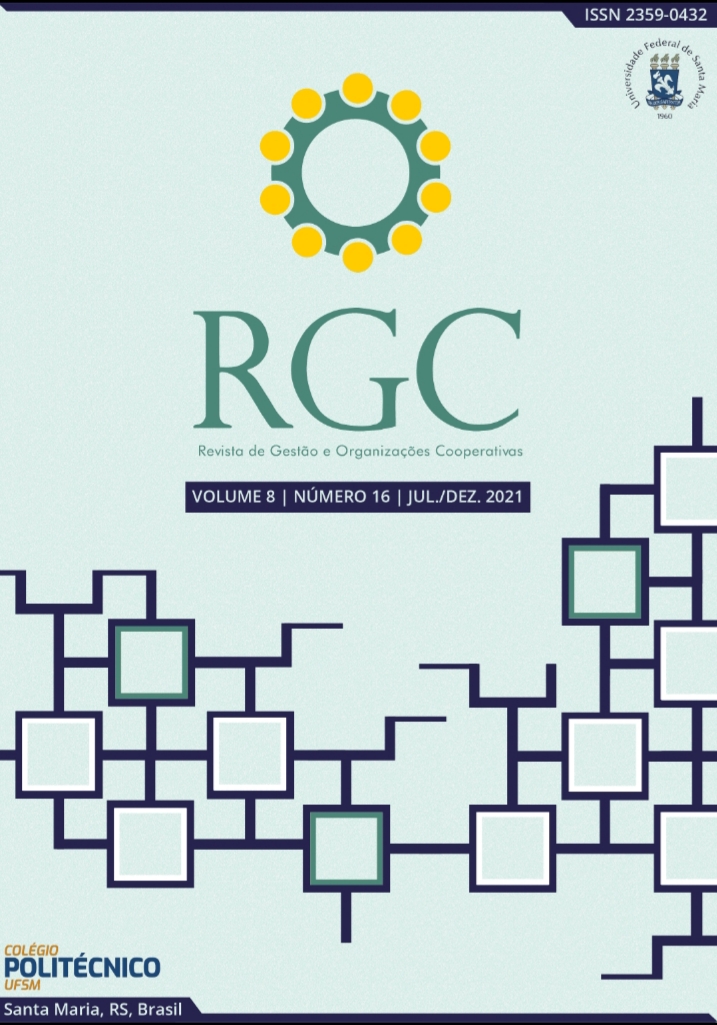Managing women: characteristics in cooperative management in Rio Grande do Sul state
DOI:
https://doi.org/10.5902/2359043243866Keywords:
women managers, features, cooperativesAbstract
This paper aims to identify and understand the characteristics of four women managers of cooperatives of different branches in the state of Rio Grande do Sul, comparing it with the model proposed by Cursino and Neto (2015). It is a qualitative and descriptive study based on a case study. For data collection we used the interview and as a form of data analysis, content analysis. As for the results, it was possible to make some relevant observations. About the categories of analysis: analytical; competitive; emotive; hardworking; intuitive; loyal; multifunctional; weighted; Concerned and sensitive, all interviewees affirmed with greater intensity the presence of these characteristics in their professional profiles regarding their applicability in their management activities. The characteristics less present in their profiles were: anxious; centralizing; insecure; conservative and dedicated. Finally, the present work achieved the proposed objectives.
Downloads
References
BARDIN, L. Análise de conteúdo. Lisboa: Edições 70, 1977.
BELL, J. Projeto de pesquisa: guia para pesquisadores iniciantes em educação, saúde e ciências sociais. Porto Alegre: Artmed, 2008.
CLARK, D. A.; BECK, A. T. Vencendo a ansiedade e a preocupação: Com a terapia cognitiva comportamental. Porto Alegre: Artmed, 2014.
CURSINO, A. M. C.; NETO, A. C. O estilo de gestão da mulher executiva brasileira: o feminino no masculino ou o masculino no feminino?. In:ANDRADE, J. O.; NETO, A. C. Mulheres profissionais e suas carreiras sem censura: estudos sob diferentes abordagens. São Paulo: Atlas, 2015. Cap. 8. Disponível em: https://integrada.minhabiblioteca.com.br/#/books/9788522496716/cfi/0!/4/2@100:0.00. Acesso em: 26 ago. 2018.
D’ANGELO, Helô. Ansiedade é muito maior nas mulheres, diz estudo. 10 jun. 2016. Disponível em: https://super.abril.com.br/saude/ansiedade-e-duas-vezes-mais-comum-nas-mulheres-diz-estudo/. Acesso em: 03 out. 2018.
GAUDÊNCIO. A sabedoria da liderança. 2013. Disponível em: https://comunicandolideranca.wordpress.com/2013/03/30/que-lider-voce-e/. Acesso em: 03 out. 2018.
GIL, A. C. Como elaborar projetos de pesquisa. 4 ed. São Paulo: Atlas, 2002.
GIL, A. C.. Métodos e técnicas de pesquisa social. 5 ed. São Paulo: Atlas, 1999.
HITEAM. Aprenda como desenvolver a sua capacidade analítica. 2018. Disponível em: http://www.hiplatform.com/blog/aprenda-como-desenvolver-a-sua-capacidade-analitica/. Acesso em: 03 out. 2018.
IBGE. Disponível em: https://ww2.ibge.gov.br/home/. Acesso em: 15 ago. 2019.
LAKATOS, E. M.; MARCONI, M. A. Fundamentos metodologia científica. 4. Ed. São Paulo: Atlas, 2001.
MARCHINI, V. Intuição é uma forma de conhecimento que está em todos nós, embora nem todas as pessoas saibam utilizá-la, diz fundadora do Centro de Desenvolvimento do Potencial Intuitivo, de São Paulo. [Entrevista disponibilizada em 11 de maio de 2017, a internet]. Disponível em: http://linktoleaders.com/intuicao-na-lideranca/. Entrevista concedida a Margarida de Sá, Acesso em: 3 out. 2018.
MARQUES, J. R. 5 Características do profissional multifuncional. 11 ago. 2017. Disponível em: https://www.jrmcoaching.com.br/blog/5-caracteristicas-do-profissional-multifuncional/. Acesso em: 3 out. 2018.
MARQUES, J. R. Sensibilidade e liderança. 26 nov. 2015. Disponível em: https://www.jrmcoaching.com.br/blog/sensibilidade-e-lideranca/. Acesso em: 3 out. 2018.
MARQUES, J. R. Ser competitivo é ruim? 11 jun. 2014. Disponível em: https://www.ibccoaching.com.br/portal/coaching-carreira/ser-competitivo-ruim/. Acesso em: 3 out. 2018.
MELLER, Willian. Você consegue ser mais do que esforçado. 7 dez. 2017. Disponível em: https://sitecampus.com.br/voce-consegue-ser-mais-do-que-esforcado/. Acesso em: 3 out. 2018.
MENDES, Jerônimo. A importância da lealdade no trabalho. 19 ago. 2008. Disponível em: http://www.administradores.com.br/artigos/negocios/a-importancia-da-lealdade-no-trabalho/24572/. Acesso em: 3 out. 2018.
RIBEIRO, Valdemir. O poder da dedicação. 9 set. 2008. Disponível em: http://www.administradores.com.br/artigos/negocios/o-poder-da-dedicacao/25085/. Acesso em: 3 out. 2018.
SBIE. Como controlar as emoções no trabalho e liderar bem uma equipe? 2017. Disponível em: http://www.sbie.com.br/blog/como-controlar-emocoes-no-trabalho-e-liderar-bem-uma-equipe/. Acesso em: 03 out. 2018.
SICOOB. A importância da mulher nas organizações cooperativas. 2011. Disponível em: https://sicoobcredip.wordpress.com/2011/03/10/a-importancia-da-mulher-nas-organizacoes-cooperativas/. Acesso em 22 ago 2018.
SILVA. A diferença entre controlador e centralizador. 2013. Disponível em: http://www.executivosincero.com.br/2013/01/11/a-diferenca-entre-controlador-e-centralizador/. Acesso em: 03 out. 2018.
SINA, A. Mulher e trabalho: o desafio de conciliar diferentes papéis na sociedade. São Paulo: Editora Saraiva, 2005.
TIRAPANI, Caco. O que significa ser conservador? 16 jul. 2015. Disponível em: https://www.revistaamalgama.com.br/07/2015/o-que-significa-ser-conservador/. Acesso em: 19 out. 2018.
ZEA, M. E. P. Cooperativas tem a tarefa de empoderar mulheres. [Entrevista disponibilizada em 8 de março de 2018, a internet] Disponível em: http://www.ocb.org.br/noticia/21029/cooperativas-tem-a-tarefa-de-empoderar-as-mulheres. Entrevista concedida a Sistema OCB, Acesso em: 26 ago. 2018.
Downloads
Published
How to Cite
Issue
Section
License
Authors who publish in this journal agree to the following terms:
- Authors retain copyright and grant the journal the right of first publication, with work simultaneously licensed under the Creative Commons Attribution License that allows the sharing of work with acknowledgment of authorship and initial publication in this journal.
- Authors are authorized to enter additional contracts separately for non-exclusive distribution of the version of the work published in this journal (eg, publishing in institutional repository or as a book chapter), with acknowledgment of authorship and initial publication in this journal.
- Authors are allowed and encouraged to post and distribute their work online (eg, in institutional repositories or on their personal page) at any point before or during the editorial process, as this can bring about productive change as well as increase impact and impact. citation of published work (See The Effect of Free Access).







